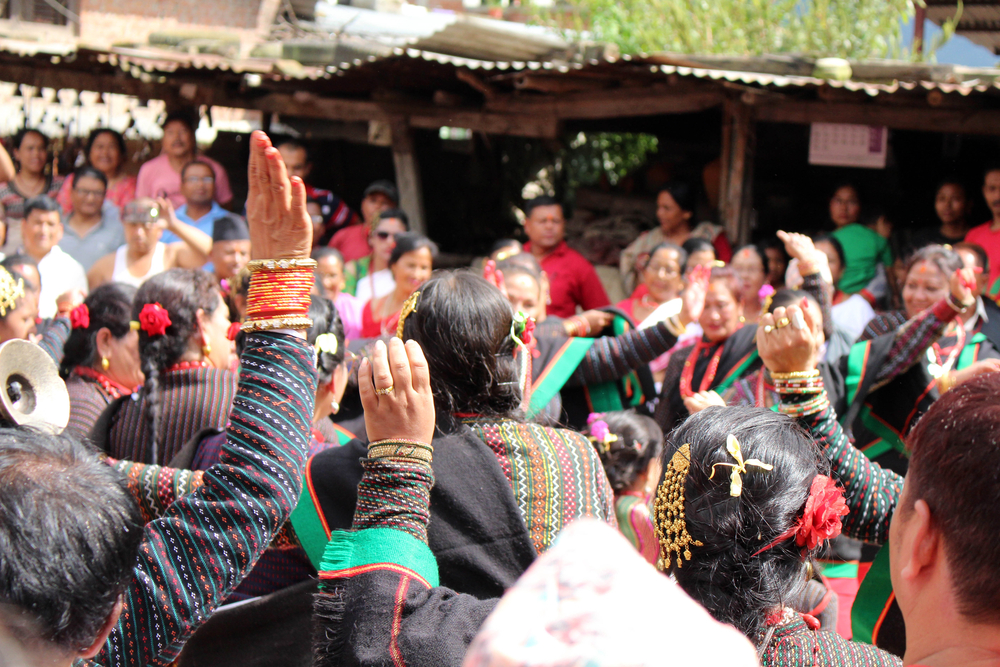A new article challenges the traditional deficit-based approach that often dominates the discourse of the global mental health movement. When a statistic is presented, such as one psychiatrist for 1.7 million people in Ghana, what is left out and forgotten? Whose knowledge, expertise and services are considered as a measure of value, and whose knowledge, expertise and services are pushed aside and made invisible?
Rather than focusing solely on the inadequacies of mental health care systems in low-income countries, Mathias and his colleagues highlight the important role of local expertise and informal care practices that are often overlooked.
Their articles are PLOS Global Public Healthargue that the “deficit framing” prevalent in global mental health discourse can perpetuate harmful hierarchies and assumptions and ignore the valuable contribution of community-based support systems.
When interventions are rationalised and scaled up within communities without due consideration of local expertise and the specific socio-historical contexts in which people with mental illness live and receive support, there is a risk that contextual relevance, the ability to respond to changing needs within the community, will be lost and local systems of care will be undermined.
Through in-depth case studies from Ghana, India, Occupied Palestine, and South Africa, the authors show how these local practices and socio-historical contexts shape effective mental health interventions and encourage a shift away from one-size-fits-all solutions.
They argue that “by centreing the survival strategies and strengths of people experienced by mental illness, their families and carers and the wider community, we can develop more appropriate, inclusive, sustainable and equitable mental health care”.
Context of care
Mathias and his colleagues began by looking at global forces and upstream structural determinants that, while less detailed, are important in shaping health outcomes and local health systems. Two prominent examples identified were colonialism and neoliberal capitalism.
Colonialism
The researchers traced the history of British colonial psychiatry, which varied across the four countries studied but typically promoted a carceral model, with resources primarily being used to build carceral institutions under the “Lunatic Act.”
In South Africa, colonial and apartheid policies created huge inequalities between whites and non-whites, hindering access to health care and other socio-economic opportunities. Psychiatric services existed in urban psychiatric hospitals, but they were heavily biased towards white patients.
In Ghana, a historic colonial legal framework resulted in people with mental illness being isolated and incarcerated in prisons and then confined to the Accra Psychiatric Hospital, the only psychiatric hospital in existence until independence, leaving people with mental illness primarily reliant on their families and communities. Centuries of transatlantic slave trade and subsequent colonial rule have created persistent economic inequalities that have hindered efforts to develop a broader public health system.
In occupied Palestine (oPt), Palestinians have been living under Israeli military occupation for over 50 years, and the conditions of settler colonialism continue to this day.
“The current war in the Gaza Strip has so far killed more than 16,000 people, 6,000 of them children. [the number is now multiple times greater since the article’s publication just a few months ago]Israel has not only carpet-bombed the Gaza Strip, but has also completely surrounded it, cutting off supplies of water, food, fuel and medicine.”
In addition to the direct impact of Israeli airstrikes, the complete blockade of the Gaza Strip has caused a severe economic crisis and led to the decline of public and mental health services.
The availability of and funding for mental health services in these countries was generally limited to a few large psychiatric hospitals, accessible only to a small proportion of the population.The emphasis on institutional services rather than community-based care continues to be seen in national health budgets today.
“In India, 94% of direct mental health care in 2022 was allocated to just two tertiary care institutions, leaving the remaining 6% to implement district mental health programmes in the rest of the country.”
“In occupied Palestine, only 2.5 percent of the underfunded health budget goes to mental health, with 73 percent of that going to the only psychiatric hospital.”
“In Ghana, the country’s three psychiatric specialist hospitals absorb most of the mental health budget, with no dedicated budget for community mental health care.”
Neoliberal Capitalism
The researchers detail the impact of macroeconomic changes on the health and opportunities of people living in the four countries studied. They argue that a neoliberal economy, characterized by trade liberalization, competitive markets, and privatization, acts as a distal determinant of increased psychological distress and reduced affordability of mental health care in communities.
Neoliberal reforms contributed to economic growth in low-income countries, but they also increased unemployment and inequality as much of the young workforce emigrated from countries such as Ghana, and the privatization of psychiatric care came at a devastating cost to families.
“Unemployment, inequality, and related health factors such as homelessness and food insecurity are consistently associated with increases in mental health problems such as depression and anxiety.”
Community Assets for Mental Health
As these global sociopolitical forces shape and affect communities, people resist, build community resilience, and form support systems that contextualize responses to local mental health challenges. Community-developed informal support systems provide care that is uniquely accessible and flexible to the changing needs within the community.
The researchers map these community assets to four main social groups: 1) family and household, 2) community and social support, 3) faith-based care and traditional healers, and 4) nonprofit organizations.
Family and home
In all four countries surveyed, the family was an important mental health asset, providing various forms of practical, social, economic and emotional support.
Findings detail how the home functions as a supportive care network and a safe space to engage in daily life and household activities. Palestinian NGO workers describe the home as the main communal space where people with mental illnesses can participate in social life while receiving protection and care.
“Palestinian families are more protective and can deal with someone who has symptoms of schizophrenia or psychosis. They become close and try to help. In some cases, like with schizophrenia or psychosis, the diagnosis is kept secret within the family. But the family doesn’t hide him from others.”
Despite the important role families play in caring for people with mental illness, government support for family caregivers is lacking in India and the Palestinian Territories, increasing the physical, psychological and financial burden on families.
Community and Social Support
Beyond the family home, wider community relationships and social networks play a key role in mental health in all four counties. The researchers show how families within caste groups in India can provide high levels of support to one another. As one community member put it, “My neighbour did all the harvesting and tending to the fields, and I would slowly make the pilgrimage with my wife to seek mental health care.”
The shared experience of farming has also helped women in rural India and South Africa to bond and reduce stress, and in Ghana and South Africa, studies have uncovered organic forms of mutual support among people with lived experience, including home visits with peers, caregivers who congregate in community spaces like prayer camps, and mothers who come together to cook and offer words of encouragement.
Faith-Based Care and Traditional Healers
In many communities, traditional healers are more accessible to residents than biomedical providers. In Ghana, traditional healers are an attractive option because they are affordable, can address mental health issues, and can provide valuable psychological support. Ghana is unique in that it is moving its model of mental health care from an institutional to a pluralistic community-based approach, integrating traditional healers into the broader formal health care system. Similar efforts are underway in South Africa, which was recently featured on Al Jazeera’s “The Take.”
The researchers examined how faith healers and religious organizations in these four countries may sometimes work to reinforce culturally mediated forms of exclusion and intensify stigma through framing mental illness as a moral failing.However, they found that many healers take a hands-on approach, working in partnership with allopathic providers.
Non-profit and civil society organizations
Mental health nongovernmental organizations (NGOs) are present in all four countries and their presence is growing. NGOs shoulder a large service burden, including health care, labor, and strengthening social networks, but their services are often concentrated in urban areas and inequitably distributed. NGOs are increasingly integrated into formal health systems and have more resources to expand their services.
But researchers say this can tie organisations to funder priorities and make them less attuned to needs on the ground. Smaller charities, faith communities and universities often receive community funding and respond to locally identified needs when there are no other available services.
Consider community context and assets
The researchers’ findings highlight the importance of strengthening and building on local assets to address specific mental health needs within communities. They found that co-creation of policies and formal mental health programs with communities is under-represented in all four countries studied.
“Co-production involves people who have experienced mental distress being involved in the design, implementation, delivery and evaluation of relevant care, resources and services to ensure that services are person-centred, cost-effective, innovative and equitable.”
The authors believe that true co-production requires a shift in global mental health funding, so that resources and power are redistributed and systems are run, led and accountable by the communities they serve.
“This allows us to maintain the key elements that make it effective, such as contextual relevance, embeddedness, flexibility and practicality.”
They caution that asset strengthening is not a substitute for addressing the structural causes of health disparities: dialogue between communities and formal health systems should focus not just on individuals, but also on the structural and political forces that affect communities.
The logic behind the shift towards community-led care goes beyond the economic and medical rationale of increasing access to biomedical treatment to a broader logic of care that includes addressing the social, political and structural causes of violence and exclusion.
“Ultimately, community-led care may not just lead to the delivery of community-based treatment, but to a redefinition of what care is all about.”
****
Mathias, K., Bunkley, N., Pillai, P., Ae-Ngibise, KA, Kpobi, L., Taylor, D., … & Read, UM (2024). Reversing the deficit model in global mental health: Examining strengths and assets of community mental health care in Ghana, India, the Occupied Palestinian Territory and South Africa. PLOS Global Public Health, Four(3), e0002575. (Link)



